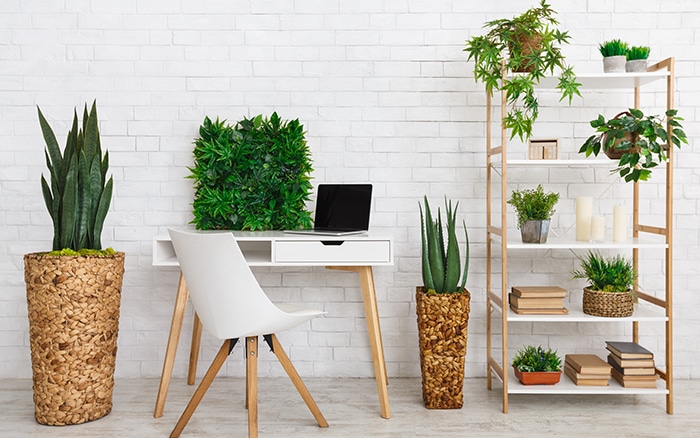Spring is here, and it’s the perfect time to repot your houseplants that are outgrowing their current homes. To make it easy for you, here are the tell-tale signs to show that you need to repot your plant and how exactly to go about it.
Positive plants
Studies have shown that indoor plants can boost productivity and help you to work better. Being around plants has been said to improve concentration, the University of Michigan studied the influence of plants, finding that they can increase memory retention up to 20%. Not only do they boost productivity but Exeter University found that greenery in the workplace boosted staff well-being by 47%, so having plants in your work area, whether that is at home or in the office, will benefit you for so many reasons.

Bringing naturally decorative foliage and flowers as well as fresh fragrances into our homes is one of the biggest benefits of having houseplants. But to take advantage of these benefits, we need to care for our plants. This means positioning them in the perfect spot, watering them, and supplying them with the right nutrients so they grow their best. This care also includes giving them a pot to fit, so how exactly will you know that it’s time?
New home for houseplants

Repotting can just mean changing the soil of your plant rather than transferring it to another container, which will supply it with new nutrients. Spring is the best time to repot but avoid doing so whilst they are flowering. Here are a few signs that it’s time to repot your prized plant.
- The roots are poking out the top or the bottom of the container.
- The soil has become mouldy or poor.
- The plant has started to grow slower than normal.
- The plant needs more frequent watering because it dries out quicker.
- The plant is top-heavy and falls over easily.
Be mindful that certain plants don’t require repotting. For example, peace lilies are happy when their roots are slightly packed, so they won’t need repotting as regularly.
Help with houseplants
It’s important to remember not to repot into a new container that is much larger than the original one, because this can lead to overwatering and damage the plant in the long run. Generally, it’s safe to go one or two sizes bigger. So, if a plant is being repotted from a 6cm container, choose one that is 8cm or 9cm.

You may need patience to get your plant out of the pot. Carefully squeeze the sizes of the pot to loosen the plant. If the roots have grown out of the bottom of the drainage holes, you may need to cut these off to get your plant out safely.
In some cases, you can push a blunt object like a pencil through the holes to cajole the plant out, or even have to cut the pot off if it really isn’t budging.
Repotting guide
STEP ONE
Water the plant the day before you plan on repotting it.

STEP TWO
Put your hand over the top of the plant and turn the pot sideways, tapping the bottom, or using the above tips to coax out your plant.

STEP THREE
Loosen the roots with your hands and prune any decayed material.

STEP FOUR
Prepare the new pot with fresh compost and place the plant in the soil at the same depth that it was in its last pot.

STEP FIVE
Top up the pot with soil, so that it comes to one or two centimetres below the rim of the pot.

STEP SIX
Press down on the soil lightly to ensure there are no air holes, and water in the plant well which will help it recover from being repotted. Place it in the best position and let it grow.

STEP SEVEN
To help your houseplant thrive, add a feed such as this Pump & Feed that will nourish your plant for one week and give you magnificent results.
Now you know how to recognise when it’s time to repot and exactly how to do it, you’re equipped to let your houseplants thrive. At this rate, your indoor gardens will be flourishing just as much as your outdoor spaces.

Leave A Comment